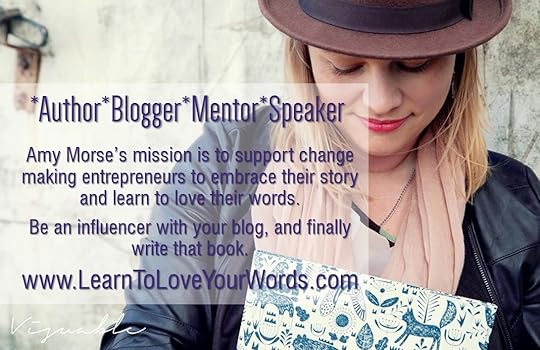Amy C. Fitzjohn's Blog, page 21
November 6, 2018
The importance of planning, goal setting and personal development for your business – A Guest Post
As we rapidly approach the end of the year (and before silly season starts), November is a great time to be looking ahead to 2019.
Have you planned your own personal development?
Where do you want your business to be next year?
What do you want to achieve?
What goals will you be setting yourself?
When you work for yourself, only you have the power to make the time you need to make these fundamental strategic decisions. To be proactive, instead of reactive, in the work you do and to move forward at a manageable pace towards realistic goals.
I’ve written before about taking a retreat with your business, but sometimes, especially when you are your own boss, you need something more formal to actually make yourself do it, instead of procrastinating and avoiding it!
Hils Crisp helps independent businesswomen market themselves with courage and confidence. We’ve done work together in the past, so I’m really pleased to host her as a guest on the blog, sharing her insights on the power of personal development in your business.

Be a good boss to yourself, invest in your own professional development and your business will reward you for it.
Over to Hils for some great insights…
The Importance of Planning, Goal Setting and Personal Development for Your Business
Do You Need Personal Development
Starting and running your own business is one of the BIGGEST personal development journeys you can undertake, along with having kids, getting divorced and changing career. It’s huge! It is the most monumental learning curve, you’re constantly pushed outside of your comfort zone, it pushes all your buttons and brings up all your deep fears and anxieties.
So, when you run your own business or are self-employed, doing your personal development ‘work’ (ie practices, exercises, being present to triggers, developing confidence, moving through fears etc) is super important. You are your business and your inner landscape (what’s going on for you internally in any given moment) will have a bigger impact on your business than it would in a larger business with several employees or directors, where that impact gets spread out.
What Does Doing Personal Development Mean
Personal development, particularly developing more authentic confidence and a resilient mindset is a whole range of things including exploring and shifting limiting beliefs (so they don’t hold you back), managing fear (because you can’t get rid of fear, only learn to master it so you can make progress), the balance of yin and yang in your life and business (and your relationship to pushing and receiving), having the right energy/vibration to attract what you want, the confidence to do your best work and the presence to put yourself out there and exploring any blocks around money and how much you can earn.
This stuff is huge actually, and underpins everything I do as a coach, workshop facilitator and course leader, because it’s so so important.
How to ‘do’ Your Personal Development
I advise you to have a regular personal development practice, something which you do several times a week. This could be journaling, meditation (guided or otherwise), EFT / Emotional Freedom Technique (I’m a practitioner of this and it is one of my main go-to tools for moving past fears or doubts), somatic practices, listening to your intuition, and much much more.
In addition, working in a group is extremely powerful, using the group energy and wisdom takes you much further than you can go alone. When it comes to confidence and authenticity you can’t really work on that on your own, because it is in the presence of others that these things get triggered and you struggle. If you want to boost your confidence, you need a safe group in which to do that, as well as plenty of practice in the real world.
Don’t ignore your personal growth work (practices, exercises etc) or it will bite you in the bum as in, it will cause you to have a massive self-doubt wobble, have no one book on your course, have you panic about money and much more! And if business is going well, keep doing it.
You can only create success to the extent of your self-belief and confidence.
Having a Plan and Strategy for Success
Creating a strategy, setting goals and making and implementing a plan are also all extremely essential to running a successful business that grows sustainably.
Even small businesses need a plan.

Having a strategy may allude many business owners in the first few months or years of having a business, with them not understanding what it could be for them, not knowing how to create one or not even knowing how useful it would be! Having a strategy, an understanding and plan of how your business makes money, what it stands for and what it’s trying to achieve is important because it gives you a clear direction and helps you make decisions.
Why You Need a Strategy, to Set Goals and Create a Plan
When you have a clear direction you can set clear goals for your business. When you have clear goals you can make a plan to achieve them. When you have a clear plan, it’s easier to take action and be productive towards achieving those goals.
A strategy on its own is pointless, goals that get set then ignored or that are not linked to the strategy are useless, and a plan that doesn’t get implemented or is not based on what is needed to achieve the business goals won’t work. Without any of these your business will lack direction, cohesive marketing and will likely be a mess!
I believe you need all three (strategy, goals and planning) working together, which enables you to take consistent courageous action, that and having compelling marketing and doing your personal growth work are my 4 ingredients for success.
How You Can Get All This in 2 Days
This is why I’m holding a business retreat in January, in Bristol which will be centred around these 2 key ingredients for success: personal growth, confidence and mindset and strategy, goal setting and planning.
Imagine creating your business strategy in the company of other ambitious businesswomen and setting your goals for 2019 by following my unique process, from a place of feeling really confident, empowered and inspired?
Imagine stepping away from the busy-ness of your working in your business and spending 2 days in a luxurious retreat setting working on your business and yourself in a way that will set you up to have the best year yet?
Imagine walking away with a detailed 90-day plan that you can start to action immediately which will directly work towards achieving all of your goals?
Imagine smashing your goals in 2019 and being one step closer to the life of your dreams?
Would you want that?
Then check out my Business Boost Retreat (https://www.facebook.com/events/251652425700081) for more information.
Feel free to get in touch to find out more about my Business, Marketing & Confidence coaching too on hils@hilscrisp.com
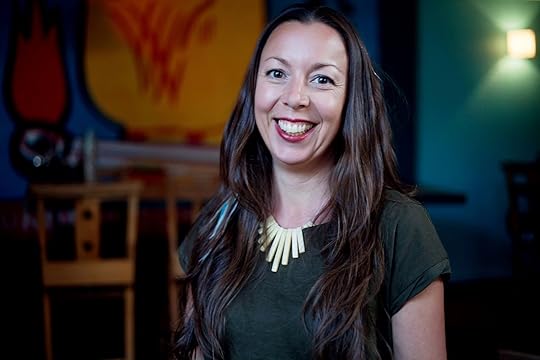
Website: https://hilscrisp.com
For instant updates when I publish a new blog post, Follow me on Bloglovin’
For extra goodies and exclusive new information, join my mailing list HERE.
The post The importance of planning, goal setting and personal development for your business – A Guest Post appeared first on Amy Morse.
October 30, 2018
Add A Little Magic To Your Blog

(A 5-minute read or a 25-minute video…)
We all have a little creative magic inside of us, if we dig deeply enough.
I firmly believe that we are all born creative and reading ‘Out Of Our Minds: Learning To Be Creative’ by Ken Robinson is backing up that belief.
Watch children playing for a few minutes to see how their imagination shapes their understanding of the world, it’s how they learn.
As we grow older, we’re taught to learn in different ways, often to the detriment of those of us who’s learning styles differ from the rigid academic structure of formal education.
Many young people slip through the cracks, believing they are ‘stupid’, having never had the opportunity to realise their true potential within the traditional educational establishment.
Many of us grow up, enter further academic education, then careers, believing we are not creative because we’re not ‘artistic’.
Creativity is problem-solving in action, and we all have that capacity. In my A to Z of Blogging series C is for Creativity.
The Magic of Stories
We are all natural storytellers. Without even realising it, we tell stories every day.
Whenever we recount an experience, even if it’s to tell our friend or partner how our day went, we wrap our words into a narrative framework – one in which we are the central character – enabling others to empathise and understand our point of view.
In the month of magic (Halloween), my free blogging skills webinar was about bringing a little magic to your blogs.
You can watch the Facebook Live recording below (25 minutes).
In the video I share 3 tips to bring a little magic into your blogs:
1) Tell a Story
Bring some narrative context to the writing.
Share an anecdote, a personal experience, an amusing reference.
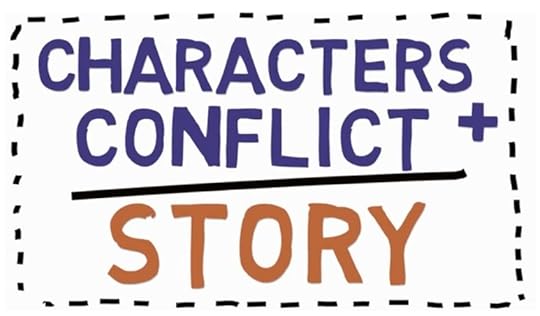
2) Have a structure
Use a really simple beginning, middle and end structure.
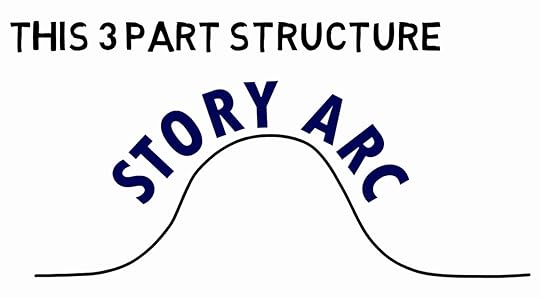
Start with an emotional hook. Guide the reader in with something warm and fluffy, something they can relate to.
Then in the middle share the ‘meat’; the factual information, the stats, the depth.
The end should leave them feeling satisfied. Get emotional again, leave them with a warm fuzzy feeling so they are ready to take another step with you – whether that’s sharing the content, following your call to action, or reading more of your content.
3) What’s your why?
Too often, we fall into the trap of telling our readers ‘what’ we do as a business in our blogs. However, the job of your blog is not to share what you do as a business (the copy on your website does that) it’s to tell us your story, to show us why you do it.
Everyone has a little voice in the back of their heads helping them make decisions, asking, “What’s in this for me?”.
Before we read anything and we engage with a business or the content they share, we subconsciously ask this.
We don’t really care what you do as a business and how it works (not at first, anyway), we want to know why it will benefit us, and often, that why is aligned with your why for doing what you do.
Share your passion. Show us why you do it. Weave it into a narrative context. Apply it to your structure – the formula – for your writing and you’ll have a successful blog, working its magic on your readers.
Magic stuff!
Watch the Facebook live video in full here (25 mins)
For instant updates when I publish a new blog post, Follow me on Bloglovin’
For extra goodies and exclusive new information, join my mailing list HERE.
The post Add A Little Magic To Your Blog appeared first on Amy Morse.
October 26, 2018
Get It Done! Don’t Self-Sabotage Your Blog (A-Z of Blogging)
 Talking to a business colleague recently, she asked me, “are you getting in your own way in your business?”
Talking to a business colleague recently, she asked me, “are you getting in your own way in your business?”
I had to be honest and say, “yes”.
When you work for yourself, you are both the biggest asset and the biggest liability to your business!
Self-Sabotage Becomes An Art Form
You talk the ideas through over and over in your own head.
Talk yourself out of things.
Convince yourself some things are brilliant ideas and that others are pie in the sky.
Ruminate over that ever-expanding To-do list to the stage where you take no action at all because it’s an insurmountable amount of work to do.
The self-talk is the loudest when you are your only colleague.

However, the worst form of self-sabotage you can practice in your business is to do nothing!
D is for Done on my A-Z of Blogging.
It doesn’t need to be perfect, but it does need to be done.

Be Mindful of Your Self-Sabotage and Change Your Mindset
Here are three reminders whenever you catch yourself slipping down that negative-procrastination slope of perfectionism:
1) Give yourself permission to be ‘good enough’.
Replace that perfectionist thinking with thinking realistically – 60% is above average. 70% is a B grade and 75% will still earn you an A!
Your blog just needs to be better than average to have an impact. The more you practice, the more your skills will improve.
2) Don’t let the fear of doing it wrong stop you from giving it a go.
If we gave in to every irrational fear that we ‘might’ do something wrong or make a fool of ourselves, we’d never achieve anything!
Unless you give it a go you will never give yourself an opportunity to improve!
3) Your writing is never as bad as you think
If I had a fiver for every person who tells me their writing is bad, I could sustain my business and never need a new client ever again!
Wherever you are on the ‘Skills Scale’ with your writing, there will always be people lower than you and always be people further along – most normal humans are in the middle somewhere.

…and you know what, ‘in the middle’ is good enough!
If you’re guilty of self-sabotaging your blogging efforts, if you are paralysed by over-analysing, join my Blogger’s Analysis Paralysis free webinar for some tips and strategies to get yourself out of your rut.
Get your tickets HERE
For instant updates when I publish a new blog post, Follow me on Bloglovin’
For extra goodies and exclusive new information, join my mailing list HERE.
The post Get It Done! Don’t Self-Sabotage Your Blog (A-Z of Blogging) appeared first on Amy Morse.
October 3, 2018
Bring Creativity To Your Blog (A-Z of Blogging)
Tapping into your own innate creativity adds sparkle to your blogs.
I firmly believe that everyone is creative, at least to some degree. Being creative is a natural human instinct.
The misunderstanding, the disbelief, occurs because when we talk about creativity, we immediately think of artists, musicians, designers, painters, sculptors, authors, crafters, artisans…

We’re all more creative than we think.
You may not consider yourself creative in the ‘traditional sense’, but really, creativity is just problem-solving. Experimentation. Play.
Starting your own business is one of the most inherently creative things we can do. We’re following our desires, we’re filling a gap, we’re seeing a need, we’re solving a problem, with our businesses.
We’re all born creative, just in different ways.
However, it begs the question…
Can you learn Creativity?
Or rather, can you re-learn being creative?
I wrote previously on how we are all natural storytellers, sharing the story I overheard between a child and an adult.
If you watch a child play for more than a few moments, you realise how inherently creative they are. It’s how they learn and understand the world.
Would it be fair to say that this innate creativity is ‘trained out of us’ by an education system that favours academia over exploration?
Schools as we understand them in the UK, were first established by the Victorian’s as a way to shape and discipline the workers of the future.
During the Industrial Revolution, emerging industrial businesses needed a ready supply of workers to maintain their future operations. To some degree, this is still true today, but in this time of Digital and Technological Revolution, the nature of work is changing.
My generation (Gen X) and those following me, no longer need training and preparation for the ‘job for life’ scenario that dominated the post-war reconstruction of Europe.
My father, my father’s father, both spent most of their lives working for one employer – Customs and Excise in the case of my dad, and Imperial Tobacco in the case of my granddad (although the war got in the way for my granddad!).
I’ve had so many jobs, worked so many temporary and fixed term contracts before becoming self-employed, that I’ve lost count! My early CV reads more like a To Do list of crap admin jobs than career progression!
Work Is Changing, Education Needs To Change With It
As someone who fell into adult learning as a career path, I find the concept of ‘creativity vs academia’ and how learning is categorised and understood, fascinating.
While in the co-working area at The Arnolfini gallery, I picked up this book from a shelf and dipped into it…
The bits I dipped into were enough to prompt me to buy, ‘Out Of Our Minds: Learning To Be Creative’ by Ken Robinson.
It includes fascinating insights, backed up by empirical evidence, about the nature and perception of intelligence and learning.
I’m working my way through the book, but I’ve already picked out quotes that resonate in this context.
For example, the pleasingly alliterative, “Cultural conditions can kill or kindle creativity.”
Your blogs should kindle your creativity not kill it! It’s your business, bring your own razzle-dazzle to your words
Tell your story, your way and do so fearlessly.
Academic VS Creative Writing
Blogging is a very different skill to writing copy, writing sales information, letters or emails.
Blogging is a creative rather than an academic exercise.

There’s a reason you don’t see academic papers and doctoral publications trending on social media…
They’re dry. They may educate and inform but they don’t entertain.
It’s easy to fall into the trap of writing academically. Anyone who has ever studied at a higher education level will be indoctrinated to write in a certain way in order to pass exams. But your purpose is not to pass an exam, your purpose is to edu-tain your audience. Help them to learn something new and not even realise it!
(Re-)learning creativity, leads to better, more compelling blogs.
What stories can you use to bring some creativity to your blog?
My next free webinar is on how to Add A Little Magic To Your Blog.
I’ll share top tips to bring the magic of creativity to your writing…
Grab your ticket HERE
For instant updates when I publish a new blog post, Follow me on Bloglovin’
For extra goodies and exclusive new information, join my mailing list HERE.
The post Bring Creativity To Your Blog (A-Z of Blogging) appeared first on Amy Morse.
September 13, 2018
Features Vs Benefits – What To Blog About (A-Z of Blogging)
 Blogging has many benefits – sometimes they are quite unexpected!
Blogging has many benefits – sometimes they are quite unexpected!
I shared my Massive List Of Reasons To Blog recently, but in this context I mean the benefits of what you do as a business…
If someone asks me what they should blog about, I’ll invariably tell them to blog about the benefits of what they do.
The job of your blog is to inspire, inform, entertain and educate.
Blog About The Benefits
The core of anything anyone ever wants to know from a business is, “What’s in it for me?”

It’d be lovely to believe that we are above such self-centred instincts, but the reality is, if we are going to spend time reading a blog, if we are considering spending our hard-earned cash on something, we need assurances that we’ll get what we want from it.
We want to know it will benefit us, otherwise, why would we do it (well, we wouldn’t, would we)?
Unless someone can see a benefit in reading your blogs and getting involved in your business, they’ll move on.
So many businesses focus on ‘what’ they do, instead of ‘why’ they do it and how it can benefit their customers.
Don’t beat yourself up about it, it’s an easy trap to fall into (which is why so many blogs fall into it!).
A successful blog is doesn’t tell us about the thing you do. It’s not about what you did today in your business and what you’re doing tomorrow (sorry, but no one cares).
A successful blog inspires, entertains, educates, informs its readers. No one cares what it is, what they care about it why!
How do you convey those benefits to your clients?
There’s a Sales 101 concept of ‘Facts, Features and Benefits’.
Often we fall into the trap of giving our readers (potential customers or referrers) the facts and the features, without spelling out the benefits (and you do have to spell them out, even if it seems obvious to you. It may not be obvious to your reader).
Facts = What is it?
Features = How does it work?
Benefits = Why would you want it?
Your WHY is the theme for your blogs. It’s the subtext in your story, and every blog is a chapter in that story.
Don’t tell us what you sell and how it works, show us how it benefits your customers. Why you’re passionate about it and the positive outcomes from using your product or service.
I did a quick Google Search and found this old blog on the difference between features and benefits – Benefits Vs Features – it’s from 2012, but still just as relevant.
I especially like this quote to put it into a context we can all understand…
“You should also never confuse either a feature or a benefit with an advantage. Advantages are like the intermediary between features and benefits; they are effectively what the feature does to eventually result in a benefit. For example, a 4G internet connection (feature) means that you can access web applications in a shorter amount of time (advantage), which means that you can quickly and easily find your way home when you’re lost (benefit). Be sure to make the distinction and understand the relationship between features, advantages and benefits.
The biggest difference between features and benefits is that the latter affect an emotional level that audiences can relate to. The fast internet feature sounds vaguely positive, but on its own, there’s no strong, immediate reason why it’s positive. Meanwhile, almost every audience can empathize with being lost and wanting an immediate solution to the problem.”
What seems to you like an obvious benefit of a particular feature, may not be as obvious to a reader.
Paint a picture show them.

What’s your why and how can you show it to your readers?
Still not sure what the theme should be for your blogs?
Join my free webinar on 26th September for some quick tips. Get your ticket HERE.
Even if you can’t make the live event, all ticket holders will get the recording.
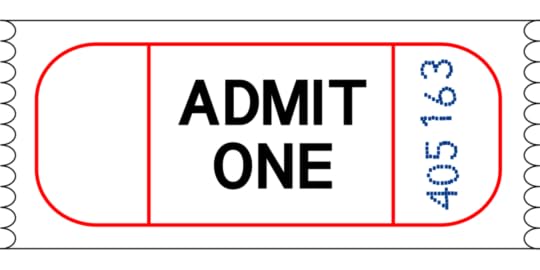
Join the Theme Your Blogs Webinar
For instant updates when I publish a new blog post, Follow me on Bloglovin’
For extra goodies and exclusive new information, join my mailing list HERE.
The post Features Vs Benefits – What To Blog About (A-Z of Blogging) appeared first on Amy Morse.
September 7, 2018
Email Tips For Start-Ups: A Guest Post

Email Marketing is a powerful tool…
When Melissa of Literary Book Gifts reached out to me over email, I wanted to help her fledgling business because I thought the products looked really cool.

Loving this typewriter tote bag!
I love a new and quirky business!
Having worked with pre-start buinesses for many years before I set up on my own, I’m constantly inspired and impressed by the great ideas, innovations, products and services people create businesses from. That’s why it’s such a privelidge to help them share their passion in their own words. To teach the skills they need to write their way to success.
No two days – or two businesses – are the same!
Melissa put together these great designs and products herself.
She was also generous enough to offer a discount code for anyone going to Literary Book Gifts from this blog (It’s at the bottom!).
I asked her to write a guest post so I could feature her business and she was happy to share her tips and insigts as a startup, making the most out of email.
Over to Melissa…
Email Tips For Start-Ups
Before launching Literary Book Gifts https://literarybookgifts.com, I thought email was nothing more than a trivial part of the business.
Get emails, reply to them, done. It can be really tempting to just use your personal email, or even a throwaway email. This is especially true at the beginning when it can feel like a hassle to set it up and manage a new account.
But this is a big mistake! Email needs to be treated like a portal to the world. Communication wise that is.
Set a few days aside to make sure you have it all set up correctly. Even if you are just using a Gmail or Outlook account it is still important to keep things neat and organized.
1. Get a new email client
Your business account needs to be separated completely from your personal or work email (if you still have a day job).
It can be tempting to use the same email client you know and love. But this is also a mistake. Things can get muddled and lost very easily with multiple emails all hooked up to one client.
In the past when all my accounts were a part of the same email apps I would occasionally send emails from the wrong addresses. This is very unprofessional and should be avoided at all costs!
Email clients may make it look simple to keep addresses compartmentalized, but the only true way to keep things separate is to use different email clients for your personal and professional emails.
2. Learn to use your email templates
Save yourself a lot of typing down the line by using your email’s built in features. The first obvious step that most people know about is the email signature.
If you are sending a lot of emails that are the same or similar figure out how to use your email’s templating can be a key part of saving time. I use Zoho mail for my needs, which has a great feature called templates. It allows me to save a preset message so I can vary it a bit when sending it to lots of different people.
3. Make sure you have a smart phone that can do everything
Emails are only good if you see them. These days a lot of people have high tech smart phones for personal enjoyment but they are essential to proper email management.
The minute you start sending out emails you could be looking at receiving hundreds if not thousands of emails back.
Emails will all vary in quality, from spam to customer service, to big business deals. But the one thing they all have in common is that they need to be dealt with quickly before they get backed up.
Having an email client attached properly to your phone helps you carve through your emails throughout the day.
There is nothing worse than feeling as though your business is running smoothly and later checking your email to find thousands of unread messages.
How do you like to manage your email for your start-up?
Melissa is the founder of Literary Book Gifts, use the promo code AMYMORSE20 which is good for 20% off anything in the store.
Website Link:
https://literarybookgifts.com
Thanks to Melissa for Contributing
I’m always open to considering submissions for guest and sponsored content on the blog.
I do, however, get a lot of requests and owe it to my readers only to publish genuinely useful content that is well written and relevant to them.
My submission guidelines are simple:
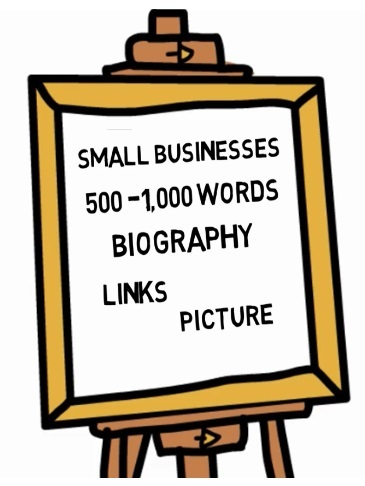
Read about what makes a good pitch HERE.
I ask $40/£30 (Via PayPal) for a ‘DoFollow’ link and to cover the cost of my time.
Guest contributors, on the other hand, I consider on a case by case basis, for a fair exchange, or if I have invited the guest to contribute.
For instant updates when I publish a new blog post, Follow me on Bloglovin’
For extra goodies and exclusive new information, join my mailing list HERE.
The post Email Tips For Start-Ups: A Guest Post appeared first on Amy Morse.
September 4, 2018
The Power of Authenticity (A – Z of Blogging)
 Authenticity is the new buzzword in Content Marketing, everyone’s talking about it (how inauthentic of them).
Authenticity is the new buzzword in Content Marketing, everyone’s talking about it (how inauthentic of them).
A for Authenticity: The A-Z of Blogging
But, what do we really mean when we talk about being authentic on your blog?
I don’t have all the answers, but I’m pretty sure there’s a Ted talk that does!
I really like Mike Robbins’ take on the subject.
Author of several books on related topics and one that shares a title with a great quote from Oscar Wilde:
“Be yourself, everyone else is already taken”
Authenticity: Share Your Vulnerability
In the talk, Mike explores the idea of a scale of authenticity. At one end you’re false, you’re projecting a glossy veneer – (Much like a beautifully manicured Instagram feed that shows a perfect life!).
It’s easy to fall into the trap of ‘promoting’ your business through your blog, leading readers to believe that everything is going swimmingly, that your business is a model of perfection.
I challenge anyone to look another person in the eye, believe their own hype that they have a perfect life and a perfect business where nothing ever goes wrong!
It will never be perfect, because perfection is a fallacy!
Yes, we want to see how successful you’ve been, but we want to see the struggles you went through to get there. That’s where the story is.
Without a ‘conflict’ you don’t have a story, you just have an unchanging and uninteresting character…

There’s nothing more compelling than a ‘rags to riches’ story.
The value you add is in the things that didn’t go well. The value is in the gaps, in the spaces between the successes and the lessons they taught you.
That’s where the ‘realness’ is – as Mike puts it. It’s the place on the other side of honesty. A step beyond.
“Realness. The other side of honest.”
He also uses a tried and tested metaphor to illustrate the point – the Iceberg.
Your business – your life – is more than the shiny, white, glossy bit that’s above the surface. The real story is the bit below the surface…
The bit we don’t see.
Lurking in the depths.
Sometimes it’s scary. Sometimes it’s treacherous. Self-destructive.
That’s the juicy bit! The iceberg is the reason the Titanic sunk – without it, there would be no story.
What are the ‘Titanic moments’ you’ve dodged?
The bits that didn’t sink you.
The dangers you steered clear of on your way to calmer seas.
To be truly authentic, tell us about those Titanic moments.
Enough waxing lyrical from me, watch this…
The Iceberg – most of it’s going on out of sight.
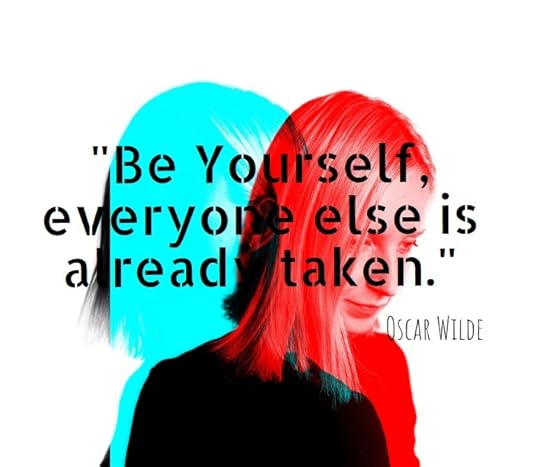
“When you are willing to be authentic, it both liberates us, and it touches and inspires the people around us”
Surely, successful blogs touch and inspire others? If not, what’s the point?
For instant updates when I publish a new blog post, Follow me on Bloglovin’
For extra goodies and exclusive new information, join my mailing list HERE.
The post The Power of Authenticity (A – Z of Blogging) appeared first on Amy Morse.
August 30, 2018
Using Research To Inspire And Inform Your Blogs
 (A less than 10-minute read or a 20-minute video)
(A less than 10-minute read or a 20-minute video)You don’t have to come up with a completely new idea for every blog you write! A little research can go a long way to inspiring and informing your writing.
My latest blogging project is to write a series of blogs from an A-Z of Blogging. I know I don’t have all the answers. Researching other people’s content will allow me to add much more value to the advice and support I give.
Watch the replay of August 2018’s free webinar. It’s just a short one, but I share three ways research can improve your blogs.
1) New Spin On An Old Idea
So, you’ve had a little flash of inspiration, an idea for a blog you want to write. Where do you start?
The chances are, someone else has already shared some content on a topic.

A good place to start is to search for it on Google, YouTube, TED.com, Social Media or content search engine, such as Pinterest.
Find something that inspires you and use it to bring your own take to a topic. Of course, you should NEVER take credit for someone else’s work, but you can pay tribute to their expertise and share how they have inspired you. As long as you’re adding value, use someone else’s creative idea as your muse!
2) What Inspires You?
Research is also a great way to come up with new ideas yourself. Often a new blog idea forms when you see something that has inspired you – A video you reshared on Facebook. A Blog link you followed from Twitter …
3) Organise Your Research!
Pinterest is a misunderstood tool and a fantastic way to capture, catalogue, curate and collect content inspiration.
Take Action:
Start a board (keep it secret if you like) to collect any links that inspire content ideas.
Happy Blogging!
For instant updates when I publish a new blog post, Follow me on Bloglovin’
For extra goodies and exclusive new information, join my mailing list HERE.
The post Using Research To Inspire And Inform Your Blogs appeared first on Amy Morse.
August 23, 2018
Why Should You Write A Book For Your Business? – A Guest Post
Publishing my first novel The Bronze Box – changed my life.
I’d realised a dream since childhood to be a published author, but sharing the process through blogging was the real game changer.
The power of content marketing started to dawn on me, and 5 years on it’s my business.
Publishing Blogging For Business was an important step, it put me on the map as a blogging for business expert, and it was really just a collection of blogs, upcycled and repurposed into an information product.
So, it’s a real pleasure to host fellow Bristol author and entrepreneur, Ann Hobbs on the blog.
Ann’s Kick Ass Your Life book changed her business and took her down a new path, helping other entrepreneurs to publish their book through her publishing house: Forward Thinking Publishing
Writing a book is a natural progression for my blogging mentees and many will choose to continue to work with me to make their writing work harder for their business. However, I really like the look of Ann’s ‘How To Write a Book in 4 Weeks‘ workshop.
Here’s Ann’s take on a few reasons to consider. Over to Ann…

Why should you write a book for your business?
A book takes time, energy and money to produce so why should you go to all that effort as a busy business entrepreneur.
Writing a book was highlighted again for me last week when I had a meeting with another business and they gave me a book written by someone else so I could understand the point he was making.
Why didn’t that business give me a book that they had written?
When I published my book 2 years ago several things happened that took me by surprise. It helped me:-
Create a bigger audience
Qualify clients
Share my knowledge / content marketing
Help me create a workshop and a licenced product from the content in the book
Gave me expert status
Saved me time with clients
I knew when I published my book Kick Ass Your Life that it would give be expert status but I was unaware of all the other benefits.
Publishing a book also helped me to sell. I actually sold a high price ticket coaching package to someone in 10 minutes. I had never met this person before and I sat next to him at a networking meeting. I asked him later why he bought from me and not from the other 5 coaches in the room. He said, “you must know what you are talking about as you took the time to write a book”.
Wow, the power of a book!
It doesn’t take that much time, all it takes is effort and motivation and when you have a structured plan for your book then writing is easy.
I am running a workshop in which I will be sharing my 5 secrets that will help you produce a book that will enhance your business in 4 weeks. No gimmicks – these are the actual 5 steps I took. I wrote my book Kick Ass Your Life in 4 weeks. If I can do it, so can you.
Don’t let your business suffer – write a book and enhance your selling power.
https://www.eventbrite.co.uk/e/how-to-write-a-book-in-4-weeks-tickets-48796303056
Visit my website for more information
For instant updates when I publish a new blog post, Follow me on Bloglovin’
For extra goodies and exclusive new information, join my mailing list HERE.
The post Why Should You Write A Book For Your Business? – A Guest Post appeared first on Amy Morse.
August 14, 2018
A – Z of Blogging: 26 Elements To Be Better at Blogging
There is so much more to blogging than writing an article for the purpose of being found on Google. Plenty of reasons to blog for your business – some a little unexpected…
…Like doing it just for the love of it – that’s ‘L’ on my A -Z of Blogging – Love.
Over the next few weeks I’ll share some quick tips and insights on the power of blogging to build your business, and here’s a little taster of what’s to come.
I’ll be exploring 26 alphabetised elements of blogging to help you make the most of what you write. If you are putting the work in, it needs to be worth, right?
A = Authentic
We can spot a fake a mile away. There will only ever be one YOU, so why pretend to be someone you’re not?
B = Benefits
Write about the benefits of what you do, not the thing itself.
C = Creativity
Blogging is a very different skill to writing copy, writing sales information, letters or emails. It’s a creative rather than an academic exercise.
D = Done
It doesn’t need to be perfect but it does need to be done. Don’t let the fear of doing it wrong stop you from giving it a go.

E = Expertise
You don’t have to be the all signing all dancing guru in a subject, your expertise lies in your take on it and your experience.
F = Facts
Strike a balance between facts and story, and never confuse ‘facts’ with ‘opinion’ (what are you, Fox News?)
G = Google
Having a Google friendly website is often the first reason people have for blogging, but there is so much more to it than that. There are a few on screen tweaks and tools you can use in your blogs to give them a fighting chance of being found in organic Goggle searches.
H = Helpful
Blog just to be helpful. Help others with the knowledge you openly share and let Karma take care of the rest!
I = Ideas
Keep it fresh and creative.
J = Jargon
Trying to impress us with your verbosity and acronyms isn’t big and it isn’t clever. Stop it!

K = Knowledge
Openly and generously share your knowledge to build a profile for yourself as an influencer and an expert in your work.
L = Love
Above all else, enjoy it! Write about what you love and what you are passionate about, then articulating it in writing quickly becomes a pleasure.
M = Meet People
Starting conversations. Showcasing other businesses. Networking with other bloggers, is a great way to grow your network of contacts and make new friends.
N = Need
What do your customers and your readers need from you? They may ask for what they want but building relationships will help you get to the bottom of what they really need from you.
Hint: they don’t just ‘need’ what you want to sell. They also need reassurance, clarity, education, support, nurturing and proof that you know what you are talking about. Show them you know your stuff, telling them isn’t enough.
O =Oppose
It’s OK to be controversial and pose an opposite view. As long as you do so respectfully, and can back up your stance. Get people talking. Spark the debate that you believe needs to be had.
P = Problem-solving
Ultimately, the purpose of any business is to solve a problem. Your blogs are another way to demonstrate your ability to recognise, identify with and solve the problems that your readers and customers may have.
Q = Quirky
Be different. Embrace you own brand of weirdness. Show your personality. Be distinctive.
R = Re-purpose
Your blogs can become books, workshops, talks, videos, courses, content for other marketing materials etc… You never just write a blog once. If you write it yourself, you can add value and reuse your blogs across your business.
S = Social Media
If you blog, you never run out of great new content to share on Social Media!
T = Tips
Quick tips make great, sharable content.
U = Unique
The only thing truly unique about your business is YOU. Show us who you are.
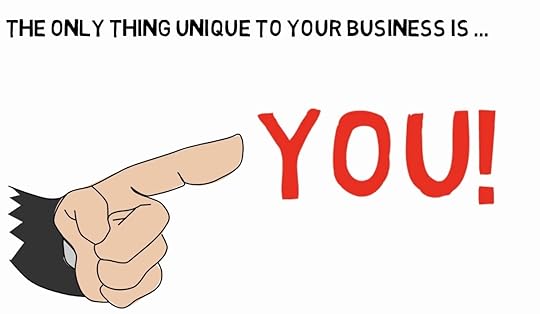
V = VLOG
I’m a writer, but you can also blog by video – ‘Video Blog = VLOG’ – Experiment with different formats to share your words and go with what you enjoy ans what comes naturally to you.
W = Wisdom
Knowledge is good, experience is good, but combine the two and that’s wisdom – Wisdom is wonderful – share it with us!
X = XRay (What’s beneath the surface?)
Tenuous, I know, but your readers don’t just want to see the glossy veneer, you’ll garner much more respect and a loyal following by showing them what’s below the surface. How did you get to where you are today and what wisdom can you share through your story?

Y = You
People don’t just buy people, they buy stories. Your story is what makes you YOU. Share it, openly, warts and all!
Z = Zoom
Zoom in on one element of your business and show us behind the curtain. Zoom in on one element of your knowledge and give us a deeper understanding.
It’s that depth and focus that adds value.
For instant updates when I publish a new blog post, Follow me on Bloglovin’
For extra goodies and exclusive new information, join my mailing list HERE.
I only send a newsletter monthly, so I won’t spam you, I promise!
The post A – Z of Blogging: 26 Elements To Be Better at Blogging appeared first on Amy Morse.

